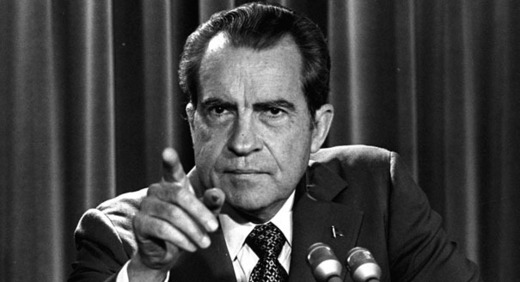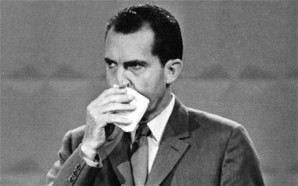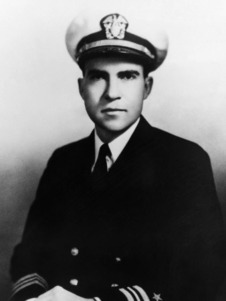






Men Of Action -- Richard "The Big Bluffer" NixonNixon Bluffs His Way Into The White House |
|
|

Richard Nixon stood in a crowd of several thousand soldiers, mostly members of New Zealand’s Third Division, and watched as a plane carrying aviation hero Charles Lindbergh taxi on the tarmac on Green Island in the South Pacific. His visit was supposed to be a morale-boosting treat for the troops, but he was upstaged.
A brown-haired, curvy nurse stepped out of the plane.
“I remember it well,” Nixon said in an interview in 1983. “In fact, Lindbergh came in the same plane as the nurse. Nobody was paying attention to him. I did. But everybody was hooting and hollering and catcalling and so forth, because, my goodness, there was this nurse. I’m telling you, she could’ve been a chimpanzee, but she was a female, and they hadn’t seen one in a long time.”
The commanding officer invited Ensign Nixon and a half-dozen or so others to have dinner with Lindbergh.
“Believe it not, I turned it down because I was the host of a poker game that night. I think back to turning down a chance to sit down with Lindbergh to have a poker game. I can’t imagine it happening. Years later, I was glad that he could be the guest at the White House when I was President.”
This was April, 1944, before Nixon became a loopy caricature for arrogance and power. He was a 30-year-old, brilliant, studious and charming man — a lawyer who graduated from Duke University before the war – and a solid poker player while serving as a Navy officer.
As a pencil-pushing passenger and cargo clerk, playing stud was the only combat Nixon would ever see.
The Big Bluffer
 Nixon learned how to play five-card stud poker from fellow naval officer James Stewart. He asked Stewart to teach him poker after watching the game for a few weeks. Nixon thought the game could be beaten, so he went to who he thought was the best player and asked him for advice.
Nixon learned how to play five-card stud poker from fellow naval officer James Stewart. He asked Stewart to teach him poker after watching the game for a few weeks. Nixon thought the game could be beaten, so he went to who he thought was the best player and asked him for advice.
Stewart gave him some solid tips. Tight is right. Only bluff when you are quite sure. Bet when you got it. Fold when you’re beat.
Much has been made that Nixon was a Quaker, which expressively forbids gambling. Like many politicians, Nixon was as religious as necessary, and there was no way he was going to let a little thing like believing in an almighty deity get in the way of what he saw as way to kill time and make a few bucks.
“The pressure of wartime, and even the more oppressive monotony, made it an irresistible diversion. I found playing poker instructive as well as entertaining and profitable,” Nixon said.
The game they played was five-card stud. Nixon called it a five-ten game, with opening raises of $5 and $5 and a third bet capped at $10.
By all accounts, Nixon was good. He was a disciplined player with a fantastic memory, a tight player who wasn’t afraid to try to push people around if he saw the opportunity. The game came as easily to him as everything else.
“He was one of those rare individuals. He never had to work for knowledge at all. He was told something and he never forgot,” said Nixon’s former high school teacher, Mary George.
Nixon and his fellow officers had nothing but time and money, and so like thousands of other soldiers at war, they played poker, day in and day out.
“Nixon was as good a poker player as, if not better than, anyone we had ever seen,” said James Udall, a lieutenant who served with him. “He played a quiet game, but was not afraid of taking chances. He wasn’t afraid of running a bluff. Sometimes the stakes were pretty big, but Dick had daring and flair for knowing what to do. I once saw him bluff a lieutenant commander out of fifteen hundred dollars with a pair of deuces.”
As an Ensign, Nixon made around $150 a month. He definitely made more money in the Navy playing stud.
“He won more frequently than he lost and sent home to California a fair amount of money. I have no idea how much, but my estimate was between $6,000 and $7,000,” Stewart said.
The money was so much that Nixon worried what his wife Pat would think of the winnings. A former Navy buddy wrote Nixon in 1950, kidding him about his concerns.
“Your prowess in stud poker is the thing I remember with very good reason. I’ll never forget the apparent concern that troubled you because of your winnings and your expressed wish that I call Pat in Frisco to break the ice,” said a man named McCaffery, whose first name is lost.
Despite the occasional big pot, Nixon was rarely the game’s big winner, but he rarely lost. He’d usually walk away from each session a little ahead, but it added up considerably in the two years he was stationed overseas with his poker-fiend Navy friends.
 “Dick never lost, but he was never a big winner. He seemed always to end up a game somewhere between $30 and $60 ahead. That didn’t look like showy winnings, but when you multiplied it day after day, I’d say he did all right,” said old friend Lester Wroble.
“Dick never lost, but he was never a big winner. He seemed always to end up a game somewhere between $30 and $60 ahead. That didn’t look like showy winnings, but when you multiplied it day after day, I’d say he did all right,” said old friend Lester Wroble.
Nixon said he took what he learned playing profitable poker home with him and his new set of skills helped him with his political career. Here’s what historian Stephen Ambrose wrote about Nixon and poker in Nixon, Vol: The Education of a Politician 1913-1962:
“Poker gave Nixon the financial stake he needed to launch his political career. It also gave him invaluable lessons that were crucial to his political career. He learned how to take the measure of his opponents, to recognize the exact moment to strike, to realize when he could bluff the man with the strongest hand into an ignominious retreat, to know when to fold his own hand and quietly withdraw from the game.”
Nixon used $5,000 of the winnings on his first congressional run in 1946, which he was victorious. He also wrote about dealing with stressful situations in his 1962 book Six Crises and it sure sounds like he knows how it feels bluffing the big stack at the table with nada.
“When a man has been through even a minor crisis, he learns not to worry when his muscles tense up, his breathing comes faster, his nerves tingle, his stomach churns. He recognizes such symptoms as natural and healthy signs that his system is keyed-up for battle.”
Frank Gannon, who conducted 38 hours of interviews with Nixon on video in 1983, asked him, “Do you subscribe to the theory that a great President must be a great poker player?”
“It helps,” Nixon said. “The Russians of course, are chess players. I never understood chess, it’s much more complicated, much more complex. But many of the things you do in poker are very useful in politics, and are very useful in foreign affairs.”
“One of the problems you see in foreign affairs, particularly, especially dealing with great leaders abroad — particularly those who are adversaries — is the almost insatiable tendency of American politicians to put everything on the table, their inability to know when to bluff, when to call, and, above everything else, to be unpredictable.”
“Unpredictably is the greatest asset or weapon that a leader could have of a major country. Unless he’s unpredictable, he’s going to find, he loses a great deal of his power.”
Ten years before, Nixon boarded a helicopter that took him away from the White House for the last time. He had tried to run over too many people, ran more than one too many bluffs. All of the skills that got him in the Oval Office – including his poker skills – had failed him and he was out.
There’s little written about Nixon playing poker in office. What there is comes from Tip O’Neill, who played with him in the ‘50s when Nixon was vice-president to Eisenhower. According to The Arrogance of Power: The Secret World of Richard Nixon, O’Neill said:
“Nixon thought of himself as a good poker player, but he talked too much and didn’t follow the cards. Moreover, he used the fact that he was the highest-ranking person at the game to his advantage.”
Now, that sounds more like the Nixon we all know and don’t really love.
But poker players have to love the strangeness of a hand that Nixon would never forget, a hand every poker player should be lucky enough to get at least one time in their lifetimes. He told Gannon about it 40-plus years after it happened, and here it is, in his own words:
“I must say though, my greatest experience, I could remember the cards to these days, a game of five card stud. The deal was made, six of us in the game, and I was dealt ace of diamonds in the hole – the card that was down.”
“And then in order – there were no wild cards in the game – in order, I got the king of diamonds, the queen of diamonds, the jack of diamonds, the 10 of diamonds. Two of the other players had a pair showing by the time we got to the fourth card. That’s very good in a five card stud game, so they kept betting. I did not raise. I couldn’t be sure. On the other hand, it would’ve been a pretty good hand to bluff on because they thought I might have doubled up the king or doubled up the queen, or what have you. So, when finally I got the 10, I didn’t make any gesture or whatever to show my excitement. I thought, my gosh, this couldn’t happen, understand that it’s a 650,000-1 shot.
 “So, the first fellow with the first pair bets, and of course, he bet the $5. The game was what we called a 5-10 game. You opened with $5, you can raise $5, third bet is $10. That’s all. So, he bet $5, the next fellow raised him, so that made it $10, and it finally came around to me, and so I did, I bet the $10, the maximum.
“So, the first fellow with the first pair bets, and of course, he bet the $5. The game was what we called a 5-10 game. You opened with $5, you can raise $5, third bet is $10. That’s all. So, he bet $5, the next fellow raised him, so that made it $10, and it finally came around to me, and so I did, I bet the $10, the maximum.
“Unfortunately, I had established my credibility too well with all the small pots. Nobody called. So I raked in the chips – it was a pretty good pot – and then, and although you should never let people see your card unless they call you, they got to pay their money to see your card, I flipped over the ace. Everybody yelled. They never saw anything like that before that, and won’t see anything like that again, probably.”
